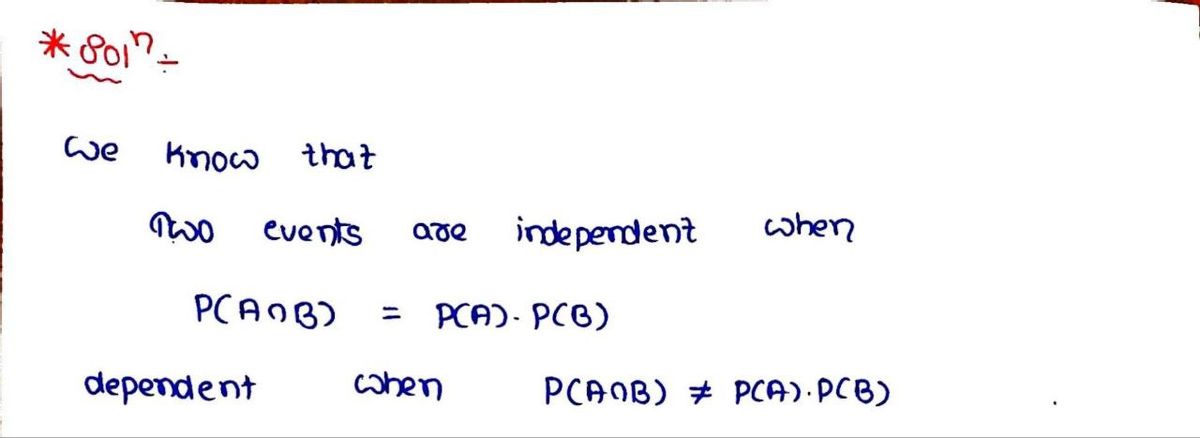Test the pair of events B and F for independence based on the following table. B 0.04 0.03 0.03 0.10 D E F Total A 0.12 0.09 0.09 0.30 с 0.24 0.18 0.18 0.60 Total 0.40 0.30 0.30 1.00 Are B and F independent or dependent and why? Select the correct answer below and fill in the answer boxes to complete your choice. O A. B and F are dependent because P(BNF) does not equal P(B)P(F). P(BNF) = and P(B)P(F)= O B. B and F are dependent because P(BNF) equals P(B)P(F). P(BNF)= and P(B)P(F) = OC. B and F are independent because P(BNF) does not equal P(B)P(F). P(BNF)= and P(B)P(F) = O D. B and F are independent because P(BNF) equals P(B)P(F). P(BNF) = and P(B)P(F) =
Test the pair of events B and F for independence based on the following table. B 0.04 0.03 0.03 0.10 D E F Total A 0.12 0.09 0.09 0.30 с 0.24 0.18 0.18 0.60 Total 0.40 0.30 0.30 1.00 Are B and F independent or dependent and why? Select the correct answer below and fill in the answer boxes to complete your choice. O A. B and F are dependent because P(BNF) does not equal P(B)P(F). P(BNF) = and P(B)P(F)= O B. B and F are dependent because P(BNF) equals P(B)P(F). P(BNF)= and P(B)P(F) = OC. B and F are independent because P(BNF) does not equal P(B)P(F). P(BNF)= and P(B)P(F) = O D. B and F are independent because P(BNF) equals P(B)P(F). P(BNF) = and P(B)P(F) =
Advanced Engineering Mathematics
10th Edition
ISBN:9780470458365
Author:Erwin Kreyszig
Publisher:Erwin Kreyszig
Chapter2: Second-order Linear Odes
Section: Chapter Questions
Problem 1RQ
Related questions
Question
100%
![**Table for Testing Independence of Events B and F**
The given table provides the distribution of events across different categories:
| | A | B | C | Total |
|-------|------|------|------|-------|
| D | 0.12 | 0.04 | 0.24 | 0.40 |
| E | 0.09 | 0.03 | 0.18 | 0.30 |
| F | 0.09 | 0.03 | 0.18 | 0.30 |
| Total | 0.30 | 0.10 | 0.60 | 1.00 |
---
**Question:**
Are B and F independent or dependent and why? Select the correct answer below and fill in the answer boxes to complete your choice.
- **A.** B and F are dependent because P(B∩F) does not equal P(B)P(F). P(B∩F) = [Box] and P(B)P(F) = [Box].
- **B.** B and F are dependent because P(B∩F) equals P(B)P(F). P(B∩F) = [Box] and P(B)P(F) = [Box].
- **C.** B and F are independent because P(B∩F) does not equal P(B)P(F). P(B∩F) = [Box] and P(B)P(F) = [Box].
- **D.** B and F are independent because P(B∩F) equals P(B)P(F). P(B∩F) = [Box] and P(B)P(F) = [Box].](/v2/_next/image?url=https%3A%2F%2Fcontent.bartleby.com%2Fqna-images%2Fquestion%2F6e89c8a0-b5c7-4d5d-8bc4-e417f7670c5e%2F928956fd-ecd5-44b9-b266-58bf0f932d68%2F1an8f05_processed.png&w=3840&q=75)
Transcribed Image Text:**Table for Testing Independence of Events B and F**
The given table provides the distribution of events across different categories:
| | A | B | C | Total |
|-------|------|------|------|-------|
| D | 0.12 | 0.04 | 0.24 | 0.40 |
| E | 0.09 | 0.03 | 0.18 | 0.30 |
| F | 0.09 | 0.03 | 0.18 | 0.30 |
| Total | 0.30 | 0.10 | 0.60 | 1.00 |
---
**Question:**
Are B and F independent or dependent and why? Select the correct answer below and fill in the answer boxes to complete your choice.
- **A.** B and F are dependent because P(B∩F) does not equal P(B)P(F). P(B∩F) = [Box] and P(B)P(F) = [Box].
- **B.** B and F are dependent because P(B∩F) equals P(B)P(F). P(B∩F) = [Box] and P(B)P(F) = [Box].
- **C.** B and F are independent because P(B∩F) does not equal P(B)P(F). P(B∩F) = [Box] and P(B)P(F) = [Box].
- **D.** B and F are independent because P(B∩F) equals P(B)P(F). P(B∩F) = [Box] and P(B)P(F) = [Box].
Expert Solution
Step 1

Step by step
Solved in 2 steps with 2 images

Recommended textbooks for you

Advanced Engineering Mathematics
Advanced Math
ISBN:
9780470458365
Author:
Erwin Kreyszig
Publisher:
Wiley, John & Sons, Incorporated

Numerical Methods for Engineers
Advanced Math
ISBN:
9780073397924
Author:
Steven C. Chapra Dr., Raymond P. Canale
Publisher:
McGraw-Hill Education

Introductory Mathematics for Engineering Applicat…
Advanced Math
ISBN:
9781118141809
Author:
Nathan Klingbeil
Publisher:
WILEY

Advanced Engineering Mathematics
Advanced Math
ISBN:
9780470458365
Author:
Erwin Kreyszig
Publisher:
Wiley, John & Sons, Incorporated

Numerical Methods for Engineers
Advanced Math
ISBN:
9780073397924
Author:
Steven C. Chapra Dr., Raymond P. Canale
Publisher:
McGraw-Hill Education

Introductory Mathematics for Engineering Applicat…
Advanced Math
ISBN:
9781118141809
Author:
Nathan Klingbeil
Publisher:
WILEY

Mathematics For Machine Technology
Advanced Math
ISBN:
9781337798310
Author:
Peterson, John.
Publisher:
Cengage Learning,

